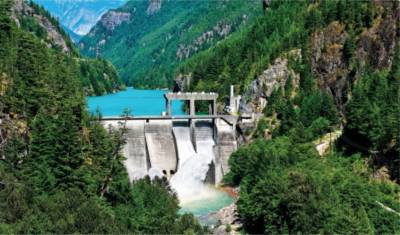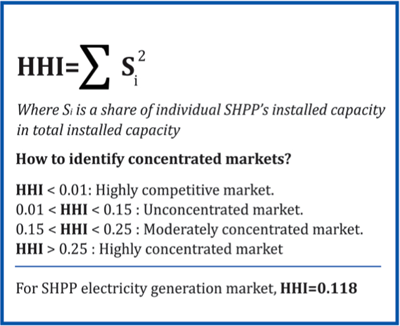Economics suggests that competition in a market brings more welfare to a country. Anti-monopoly agencies exist to create policies that limit market dominance and achieve competition. There are, of course, cases when natural monopolies emerge (for example, railways – where no one would build a parallel line to an existing one) and the solution to prevent monopolies in such instances is to regulate the businesses or take them into state ownership. It is, however, difficult, but not impossible, to find an instance when a market is competitive, but where no competition among players is observed. While there has been much talk about monopolies or oligopolies in different sectors in Georgia, there is one sector where one can find this; where the market is unconcentrated but in which no competition takes place. The electricity generation sector. Why do small hydro power plants (SHPP) not compete with each other?
According to the Georgian National Energy and Water Regulatory Commission (GNEWRC), a regulatory authority, at the beginning of 2012 there were 13 companies licensed to generate electricity in Georgia. There are also 33 SHPPs, which do not need a special license but have the privilege of selling the electricity generated to all interested parties, including households and small businesses. These privileges can serve as an instrument for attracting investments in SHPPs, which would benefit both the SHPPs and other businesses. How can this model work?
On the supply side, the SHPPs have an incentive to sell the electricity they produce at the highest price to make the highest possible profit. On the demand side, there are companies involved in different sectors (such as agriculture, tourism, education, and healthcare) that have the same aim of maximizing profit and, as electricity accounts for a noteworthy share of their costs, they should be interested in getting cheap energy. Having intensive electricity trading among SHPPs and business representatives will beneficial for both sides and increase the incentives for SHPPs to supply more.
But allowing SHPPs to trade with all interested parties does not mean that trading will actually take place. Generally speaking, the reasons that intensive trading might not happening are:
- A concentrated market, providing high prices on electricity;
- Information asymmetry, with businesses not being aware about this opportunity;
- The inability of SHPPs to supply demand;
- Lack of incentives to trade.
The Herfindahl–Hirschman Index (HHI) is often used to measure the competitiveness of markets. By estimating market concentration (competitiveness) using the HHI we find out that the SHPP generation market is unconcentrated, meaning that none of these generators can affect prices. So, we have a competitive market with no competition. Why might this happen?
From my personal experience, awareness amongst businesses about the opportunity to trade directly with SHPPs is very low. This is one of the reasons why there might be disruption, even though the vast majority of SHPPs can supply electricity for several businesses simultaneously.
To promote SHPP construction, there is a policy allowing SHPPs to sell their electricity to the Electricity System Commercial Operator (ESCO) at a predefined tariff. ESCO buying the electricity generated by SHPPs cuts the incentive for them to search for other clients. Even though the SHPPs can sell electricity at a higher price, they agree to cooperate with the commercial operator. The efficiency of such policy can be called under question and needs to be examined. Another issue is whether the distribution companies would welcome such changes. Strong legislative instruments would thus be required to deal which potential problems in this direction. These reasons might kill competition in a competitive market. Somehow supporting trade among businesses and SHPPs may be the best option for attracting investment in SHPPs, which, at the same time, would benefit the businesses.


















Comments
I don't think this is about competition or lack thereof. The puzzle is that small HPPs are free to sell directly to customers, cutting out intermediaries (transmission and distribution companies). Yet they prefer to sell to ESCO (the market regulator), at a price that is lower than they could have fetched in the market. Moreover, many consumers could have saved by buying directly from small producers. So your question is: why direct trade is not happening?
Isn't it simply the case that direct trading is too complicated and costly in the current environment?
That’s why only allowing trade (by law) is not enough. Even though they are allowed to trade and market is competitive we do not see any intensive trade among SHPPs and business representatives. There is a need for something else. Cooperative of SHPPs might be more effective. Why the do not exist? I think problem is inside the market and in right incentives. I think we really need for changes. If Georgia really wants to liberalize the sector according to EU requirements, I personally think that it is better to liberalize gradually (starting with SHPPs) and not liberalize whole generation sector at once.
Admittedly I don't know anything about electricity markets, but maybe what ESCO does is to pool the risk. For consumer the risk that a particular small HPP is not able to provide the required electricity. For a small HPP the risk that a consumer is consuming less (or more) than initially thought and negotiated.
Yes, ESCO does something like risk pooling. But question is if ESCO is the only player which can do this. There might be other instruments to overcome this problem more efficiently and promote direct trade among players.
Construction of HPPs requires a large investment up front, while the operational costs are quite low. As opposed to other types of power generation. ESCO role as a pool obliged to buy all the electricity from SHPPs is key at this stage to estimulate the development of SHPPs in the country.
Besides, not having reached the next stages in the liberalisation of the power market, it is not correct to say that SHPPs can sell to anyone.
While ESCO is important payer, there might be more efficient ways to provide same service for SHPPs. Like SHPPs cooperatives.
GEORGIAN LAW ON ELECTRICITY AND NATURAL GAS, Article 23(4)
Electricity Trading by Small Hydro Power Plants Small Power Plant is
authorized to sell the electricity to:
a) Eligible enterprise;
b) Retail customer.
where retail customer is a person receiving the electricity (capacity) from the generation, transmission or distribution network only for own consumption, when this person is not the direct customer;
Does it mean something different?
It is just that there is some inconsistency between the law and the market rules currently in practice (retail customers will only be free to choose their provider by 2023). Besides, the effort in negotiating and managing acces to the distribution networks and the billing (and getting paid from) retail customers, makes the retail market unattractive to small generators like the SHPPs.
On the other hand, an association of SHPPs or the establishment by them of a commercial operator bundling all their production could give them better marketing power and lower transaction costs to obtain higher prices for their electricity. This could be of particular use to get access to the highly profitable Turkish electricity market in the Summer months.
I agree with Inigo: ESCO does play the crucial consolidator role. There could be a different way to perform the same function (SHHP association?), but the current market environment is not yet ready for direct trading. So, if, indeed, direct trading can produce a better outcome, the policy challenge is to change the market environment.